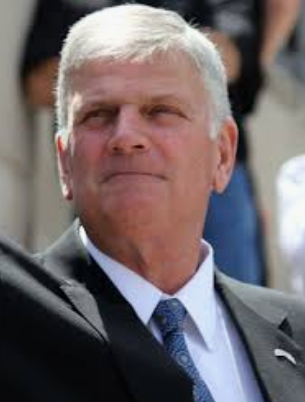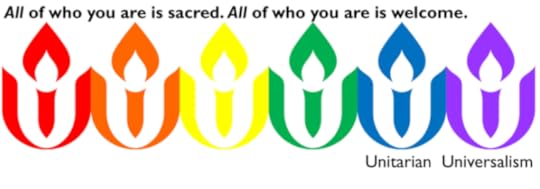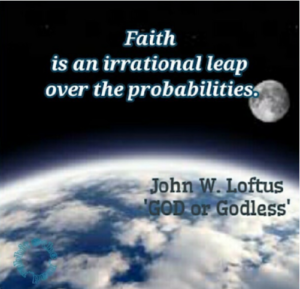Randal Rauser's Blog, page 63
February 8, 2020
Is Franklin Graham a bigot or a victim?
 Franklin Graham is scrambling to reschedule venues for his upcoming evangelistic tour of Britain. All the venues he had booked have since canceled because of his stance LGBT people and his view that gay marriage is an abomination.
Franklin Graham is scrambling to reschedule venues for his upcoming evangelistic tour of Britain. All the venues he had booked have since canceled because of his stance LGBT people and his view that gay marriage is an abomination.
From the perspective of LGBT advocates, Graham’s stance is no different than a person who calls interracial marriages an abomination against God. Meanwhile, Graham believes that his religious rights are being trampled.
Which side do you agree with? Is this a matter of civil rights vs. bigotry? Or is it a matter of religious freedom and freedom of speech? Or is it something else?
The post Is Franklin Graham a bigot or a victim? appeared first on Randal Rauser.
What caused God? What floats my boat?
Sam Harris raises the old village atheist query “What caused God?”. As he puts it: “the notion of a creator poses an immediate problem of an infinite regress. If God created the universe, what created God? To say that God, by definition, is uncreated simply begs the question.”
Sorry, but that’s like saying “if you think a boat will hold you up on water then what holds the boat up? To say that a boat, by definition, ‘floats’ simply begs the question.”
Nah, it don’t work that way: boats float and hold up things that don’t. That’s what it is to be a boat.
And God necessarily exists and sustains things in existence that don’t. That’s what it is to be God.
The post What caused God? What floats my boat? appeared first on Randal Rauser.
February 7, 2020
Does Open Theism Have an Advantage in Explaining Evil?
The post Does Open Theism Have an Advantage in Explaining Evil? appeared first on Randal Rauser.
February 4, 2020
Muslims and Christians Pray to the Same God
I’ve addressed this question before (on several occasions) but I thought this brief tweet I posted might be of interest to some to carry the conversation forward:
Muslims & Christians both refer to the same being when they say “God”. If they weren’t, then they wouldn’t be disagreeing about whether that being is triune or not. Ergo Muslims and Christians also *pray* to the same being. How those prayers are received is a separate question.
In short, shared reference is required to explain religious disagreement. Once you recognize shared reference, however, it follows that all parties who refer to that being can direct worship acts toward that being. As I conclude, that says nothing per se about how those acts are received or whether they are sufficient to establish (or be the medium of) a salvific relationship with that being. Thus, my point is a relatively straightforward (but not trivial) one about linguistic reference rather than a question of salvation let alone truth or pluralism (as some incautious readers may assume).
The post Muslims and Christians Pray to the Same God appeared first on Randal Rauser.
February 3, 2020
A Logically Valid But Unsound Argument for Biblical Inerrancy
Here is my attempt to articulate a logical argument in support of inerrancy. By “inerrancy”, I refer here to the view that the affirmations of all human authors are true. I should stress that this is not a view I hold and I have little sympathy with this argument. But be that as it may, here it is.
God is omniscient, omnipotent, and omnibenevolent.
As omniscient, God would know if any false proposition was going to be written within the Bible with the intent that it be affirmed as true by a human author.
As omnipotent, God would be able to prevent any false proposition from being written in the Bible with the intent that it be affirmed as true by a human author.
As omnibenevolent, God would want to ensure that no false proposition was written in the Bible with the intent that it be affirmed as true by a human author.
Therefore, there is no false proposition in the Bible written with the intent that it be affirmed as true by a human author.
To my mind, the Achille’s heel is premise 4. Why think that this is true? I can think of many reasons why it wouldn’t be true: for example, divine accommodation in pursuit of progressive revelation; the use of dynamic foils to make a deeper point within the text; evidence that statements in the Bible which were believed by particular human authors (e.g. statements of the movement of the sun; advice about the propriety of beating children; statements that God hates sinners) are false.
For those (and other) reasons, I conclude that 4 is false. God could have many reasons to include false propositions within the Bible that were believed to be true by the original authors who wrote them.
The post A Logically Valid But Unsound Argument for Biblical Inerrancy appeared first on Randal Rauser.
February 2, 2020
Being Religious Does Not Make You a Theist
Almost a month ago, I published an incredible, awesome article titled “Being a Theist Does Not Make You Religious.” The point was to desynonymize “theism” and “religion,” to break the easy conflation of these terms, to show that a person may be one without being the other. And so, in that article, I established that one may be a theist without being religious.
But what about the other direction? Might one be religious without being a theist? That will be the topic of this article. And the short answer is: yes, absolutely. My argument appeals to a very well established principle: actuality entails possibility. In other words, one definitive way to answer the question of whether x is possible is to see if there are any instances of x being actual. If you say “It is not possible for any birds to live in Antarctica!” my pointing out “Yeah, but check out these penguins!” is a definitive rebuttal. (“Okay, smart guy, but no parrots live in Antarctica!” “Yes, I agree with you there.”)

So what’s our equivalent example of actual birds in Antarctica, our example of religious people who are non-theistic? My example is Unitarian Universalism (UU). I spoke in a UU congregation in Arizona in 2016 while on a promotional tour for my co-authored book An Atheist and a Christian Walk into a Bar. As we will see below, the UU is actually the perfect setting for the conversation that Justin Schieber and I had in that book.
In order to get our equivalent of penguins in Antarctica, we will need to establish that UU is a religion and that it is non-theistic. In terms of religion, the UU defines itself as a “Faith” (a common synonym for religion), they have “religious practices,” they meet on Sundays in congregational gatherings for worship, they sing their own hymns, they have creedal statements of belief and practice, and they even have developed formal catechesis for younger adherents.
I don’t think that religion should be thought of conceptually as an identity that admits to necessary and sufficient conditions. Rather, it is a family resemblance concept and UU exhibits multiple hallmarks: it’s one of the family. In other words, if it looks like a duck, swims like a duck, and quacks like a duck, then it’s a duck (or, in this case, a penguin).
What about the non-theism part? To answer that, we need only consider their own statement of Beliefs and Principles:
“Our beliefs are diverse and inclusive. We have no shared creed. Our shared covenant (our seven Principles) supports ‘the free and responsible search for truth and meaning.’ Though Unitarianism and Universalism were both liberal Christian traditions, this responsible search has led us to embrace diverse teachings from Eastern and Western religions and philosophies.
“Unitarian Universalists believe more than one thing. We think for ourselves, and reflect together, about important questions”
You might put it succinctly as follows: UU is a commitment to seek truth in community whatever that truth might turn out to be. Consequently, this faith welcomes atheists and agnostics into full membership and participation in their community just so long as they share that desire to know. In fact, the UU website includes a specific section devoted to Atheist and Agnostic Unitarians.
Next, I’d like to deal with the question of size and establishment. The UU was formed in a formal merger in 1961 and today has approximately 200,000 members in the United States and 800,000 worldwide. It is not a major world religion but it most surely is a religion.
So imagine a UU named Dave. A lifelong atheist, he nonetheless grew up in the church, has been a member for as long as he can remember, attends Sunday services and other social events religiously, sings the hymnody with gusto, seeks to apply his faith commitments in acts of service and to live an upright ethical life, teaches the catechism to his children, and seeks to embody the tireless pursuit of truth in love that embodies the UU religion. Is Dave religious? Certainly, he is.
Some years ago, I met an atheist named Daniel. He told me of the time that he deconverted from Christianity. It was a very difficult and lonely time for him. But for a time, he found a new community by joining a UU congregation. However, that didn’t last and by the time I met him he was a faithful participant in the Society of Edmonton Atheists, a group that meets regularly within Edmonton in pursuit of their understanding of science, ultimate meaning, and the good society.
The UU is clearly a non-theistic religious community and so it is no doubt that such communities exist. Perhaps the more interesting question is how many of the local skeptic/atheist/humanist groups like the Society of Edmonton Atheists might likewise meet the standards for being religious communities. Do they, too, have that family resemblance? It’s an interesting question but it cannot be answered while sitting in one’s armchair. Rather, it can only be answered by getting up and getting to know those specific communities. Religion, it turns out, could be far more widespread than we ever supposed.
The post Being Religious Does Not Make You a Theist appeared first on Randal Rauser.
February 1, 2020
“I believe because it is absurd”: On atheist abuse of Christian rhetoric
 I can’t count the number of times I’ve seen an atheist cite 3rd-century theologian Tertullian’s statement “I believe because it is absurd” as evidence that “faith is irrational.” That’s equivalent to citing unemployed Miguel as evidence that “Mexicans are lazy.”
I can’t count the number of times I’ve seen an atheist cite 3rd-century theologian Tertullian’s statement “I believe because it is absurd” as evidence that “faith is irrational.” That’s equivalent to citing unemployed Miguel as evidence that “Mexicans are lazy.”
What is more, it’s quote-mining which does violence to Tertullian’s point. The passage (which appears in Tertullian’s book On the Flesh of Christ, a polemical response to Marcion), reads as follows:
“The Son of God was crucified; I am not ashamed because men must needs be ashamed of it. And the Son of God died; it is by all means to be believed, because it is absurd. And He was buried, and rose again; the fact is certain, because it is impossible. But how will all this be true in Him, if He was not Himself true—if He really had not in Himself that which might be crucified, might die, might be buried, and might rise again? I mean this flesh suffused with blood, built up with bones, interwoven with nerves, entwined with veins, a flesh which knew how to be born, and how to die, human without doubt, as born of a human being. It will therefore be mortal in Christ, because Christ is man and the Son of man.”
It should be obvious to any moderately charitable and sophisticated reader that Tertullian is using hyperbole to make a perfectly valid point. And what is that point?
In response to Marcion’s dismissive incredulity he is arguing that the plausibility of some truth claims is increased to the extent that they do not conform to commonly held assumptions. Tertullian’s thinking is like this: the Christian story of incarnation and atonement confounds common Greco-Roman assumptions about deity. It is not what you would expect to hear. In Tertullian’s view, this suggests that the genesis of the belief cannot be explained merely by appeal to recycled familiar tropes that circulated in the ancient world. Sometimes truth, as they say, is stranger than fiction. And the very strangeness of a claim can testify to its truth.
Now you may think Tertullian has a good point here or you may think he does not. But what you really can’t do is cite this single statement — “I believe because it is absurd” — as evidence that Tertullian was an irrational fideist, still less that “faith” is itself somehow irrationally fideistic.
For further discussion on the modernist anti-religious abuse of Tertullian’s words, see Peter Harrison’s article “‘I Believe Because it is Absurd’: The Enlightenment Invention of Tertullian’s Credo,” Church History, 86, no. 2 (2017), 339-64.
Note: Portions of this article were previously published in my 2014 article “Peter Boghossian’s Manual for Wasting Paper (Part 7): Doxastic Closure.”
The post “I believe because it is absurd”: On atheist abuse of Christian rhetoric appeared first on Randal Rauser.
January 31, 2020
Apologetics and Moralism

Oooh! Sinful playing cards!
Many conservative Christians believe Christianity requires a narrow moralism in which Christians don’t dance, drink, swear, play cards, see Restricted movies, etc. This becomes a real obstacle for apologists because a narrow, arbitrary moralism does not appear to be a plausible candidate for being the revealed religion of the one true God.
For that reason, challenging narrow moralism is not just good theology and ethics: it’s also good apologetics (or, if you prefer, pre-apologetics).
So share your arguments for God’s existence, but also share your thoughts on the latest great movie you saw or that great microbrew you just drank. Let people know that Christianity affirms the world and is culturally engaged and sophisticated. Pharisaism is not Christianity
The post Apologetics and Moralism appeared first on Randal Rauser.
January 30, 2020
The Myth of the Authoritative Deconvert

Now that’s a big chip…
I often encounter a popular idea that deconverts from a particular belief community provide a uniquely authoritative insight into that community and its practices and thus a uniquely authoritative basis to reject it. The idea is like this:
“Oh, you want to live in New York? It’s a hellhole, believe me: I lived in Brooklyn for twenty years.”
By the same logic, if you meet a former Catholic-turned-fundamentalist-Christian who now rails against the Catholic Church, well his perspective is especially authoritative because, hey, he was a Catholic. And if you meet a former Baptist preacher-turned-atheist who rails against Christianity, well, his perspective is especially authoritative because, hey, he was a Christian.
However, in my experience, the last people I go to when I want to learn about a particular group is an angry deconvert. While those folks may have legitimate insights, they also typically have a chip on their shoulder the size of Obelix’s menhir.
The post The Myth of the Authoritative Deconvert appeared first on Randal Rauser.
January 28, 2020
The Cross and the Gun: Stephen Bedard on Military Chaplaincy
What hath the cross to do with the gun? How does the peaceable kingdom that exists proleptically in the church relate to the realpolitik of civil government? And what guidance can we find for a Christian who finds themselves straddling these two worlds?
In this article, I interview Canadian apologist Stephen Bedard on his work as a military chaplain. Stephen is the Pastor of Queen Street Baptist Church, St Catharines ON and the Military Padre of Lincoln and Welland Regiment. He is the author of Unmasking the Pagan Christ (with Stanley Porter) and How to Make Your Church Autism-Friendly. You can visit him online at www.stephenjbedard.com
 RR: Stephen, thanks for joining me in this conversation. The other day, I saw one of your tweets in which you wrote “Loving being back in military chaplaincy.” Over the years, I’ve known several military chaplains, and I’ve known many other Christians who were uncomfortable with military chaplaincy. Given that you’re a pastor and a Christian apologist, I thought this would be a good opportunity to hear your thoughts on the matter.
RR: Stephen, thanks for joining me in this conversation. The other day, I saw one of your tweets in which you wrote “Loving being back in military chaplaincy.” Over the years, I’ve known several military chaplains, and I’ve known many other Christians who were uncomfortable with military chaplaincy. Given that you’re a pastor and a Christian apologist, I thought this would be a good opportunity to hear your thoughts on the matter.
To start us off, could you say a bit about what your job as a military chaplain looks like and what your history with the military is?
SB: Thanks Randal for this opportunity.
I had no military experience before joining as a chaplain. I have family that belong to the Canadian Armed Forces (CAF) and who have deployed overseas. Although they are not religious, they commented about the impact of the chaplains (commonly called padres). I joined because I was pastoring in a town that was close to a military base. I got to know the chaplain on the base and had the opportunity to help as an on-call civilian chaplain while the regular chaplain was away. I loved the experience and began the joining process. I belong to the reserves, as opposed to the regular forces, and so I continue as a pastor of a local congregation as my main occupation.
One of the things that I appreciate about military chaplaincy (at least in Canada) is that there are three levels of ministry.
I am a protestant chaplain, meaning I am available to meet the spiritual needs of other protestant Christians. If we were in the field, I could lead them in a communion service or other religious rite. I can also include our shared faith in my pastoral care with them.
I am also responsible for making sure that everyone’s religious needs are met. I cannot hear a confession from a Roman Catholic member, but I can make sure a priest is made available. I have worked to make sure Muslims have time on a training night to pray or that the proper food is available on an exercise.
I am also available to provide pastoral care to all members of every religion or none. While I’m not a trained counselor, I do listen to the emotional needs and help them to sort through their circumstances. The CAF relies a lot on chaplains to help with the mental health of the units.
Very little of what I do is religious in nature. I have been in the CAF for almost eight years and just recently participated in my first military church service. There is no proselytizing, although I find that members of the unit (Christian and non-Christian) often ask questions about religion.
RR: What kind of training does a Canadian chaplain receive? Do you go through boot camp with the soldiers?
SB: Training in general for the CAF is an ongoing process. No one is ever done their training. But there are certain required training experiences.
It begins with Basic Military Officer Qualification (BMOQ). Chaplains start with the rank of captain and all officers must take the BMOQ. When I did my BMOQ, it was just chaplains in the class. Since then, chaplains now do their BMOQ with medical officers.
This basic training for chaplains is pretty much the same as that of other officers (e.g. marching, fitness, leadership training), there is one important difference. Chaplains are the only members of the CAF that do not receive weapons training. Even doctors, lawyers and public relations officers receive weapons training. The closest we get to a weapon is to learn how to make it safe if we find one unattended so that it can be moved without an accidental discharge.
Other than this basic training, we receive some chaplain specific training, including ethics and pastoral counselling. We also train with the soldiers in our unit, but never with weapons. If a chaplain was caught using a weapon, there would be consequences.
RR: Helpful background, thanks. So let’s dip into some of the concerns that some Christians might have with military chaplaincy. The good that a chaplain can do is undeniable. But a critic might worry that the Christian is forced to compromise too much to have that sphere of influence.
Imagine, for example, that an American chaplain is working with the marines in 2003 as they are invading Iraq. As a Christian, he has deep ethical concerns about the legitimacy of the war and its devastating impact on the civilian population. But as a chaplain in the marines, he is obliged to respect the chain of command and keep his head down. The military does not take kindly to prophetic protest. Can you see how this could introduce an ethical conflict for the Christian, a battle of loyalties? And if so, how would you propose navigating it?
SB: I cannot speak to the American system but I can about how things work in the CAF. All officers (not just chaplains) have to take courses in ethics and this kind of scenario is covered. The CAF is a voluntary military, meaning no one is forced to serve. We can request a release at any time.
When faced with a situation that we are struggling with morally, we have a number of options. On a smaller scale, any member (including a chaplain) can pass concerns up the chain of command. For example, if a unit was acting inappropriately in a specific village, a chaplain may be able to influence a change of behaviour. That would likely be ineffective on a larger scale, such as the legitimacy of a specific war or the overall strategy.
Such a member would then have to decide if they can in good conscience participate in such a conflict, even in a supporting role. If not, they would be best to resign their commission and be a prophetic protest as a civilian. There have been examples of high ranking officers (not chaplains) who have resigned their commission to critique a policy they could not while within the military.
Speaking for myself, I would follow orders and not publicly critique policy as long I was serving as a member of the CAF. If I ever thought that service would require a compromise of my Christian beliefs, I would resign my commission.
RR: That’s very helpful, Stephen. Thanks for clarifying. Now I’d like to ask you a more abstract question. As a Christian, I often find myself torn between the idealism of the pacifistic Christian tradition and the realism of just war theorists. With the former, I want to stand against the so-called myth of redemptive violence, but with the latter, I find myself drawn to the earthy realpolitik that recognizes violence will always be a part of our world and I might at least have a role in making it more humane.
The tension I feel can be captured in the story of Joseph-Ignace Guillotin, a follower of Jesus whose hatred of executions led him to propose a more humane mode of execution. On the one hand, if I’m going to be killed, a quick beheading is one of the least bad ways to go. But on the other hand, as a Christian I am chilled to the bone at the thought of having my greatest legacy being a more efficient means of removing a person’s head from their shoulders.
I suspect that as a military chaplain, you’ve got ample opportunity to wrestle with these questions. To put it bluntly, how do you balance taking up your cross (Luke 9:23) with taking up your sword (Luke 22:36)?
SB: I’m sympathetic with the tension you describe. I would much prefer that there not be any war and I look forward to the time when war finally comes to an end. I cannot speak for others but I am not hoping for opportunities for members of my regiment to have to go to war.
In terms of balancing taking up the cross and taking up the sword, that is a great question. I actually see taking up the cross as a powerful image for what soldiers do. Taking up the cross is about taking on the posture of self-sacrifice. It is about not putting your comfort first and being willing to put one’s life on the line. The recent movie 1917 is a great example of this. While not about chaplains, it highlights the willing to put oneself in danger to save others rather than the ability to kill the enemy.
Now as a chaplain, I am not called to take up the sword. I will not be put into a position where I have to use a weapon against another person. However, I do support soldiers who are put into such situations.
I am able to support the military because I do believe that using force for the purpose of protection is appropriate. Not only are many of the soldiers not Christian and therefore not bound to Christian teachings, I don’t believe that the Bible prohibits the use of force to protect the vulnerable. I understand that is not universally accepted by all Christians. I have the advantage to not have to choose for myself whether or not to use force but I also happen to believe that there are acceptable uses of force.
RR: Would you be able to share an experience from your time as a chaplain? One example that might give us a better sense of the work you do and the difference it can make?
SB: I can’t give just one example of what being a chaplain is like. When I read your question, I was struck by the wide range of experiences I’ve had. I’ve provided pastoral care to members with PTSD, both Afghanistan veterans and those injured in their civilian employment. I have been able to pray with soldiers who are Christian and also made sure the faith needs of Muslims and Sikhs have been met. I have sat with Jewish and Muslim soldiers discussing the uniqueness of our own faiths and I have had non-Christians ask me questions about my faith.
I have had people ask why I didn’t just help out as a civilian pastor, providing care as called upon. For myself, military chaplaincy is one of the clearest examples of incarnational ministry. I wear the same uniform as them and have (mostly) the same training. I have opportunities for ministry that I would never have as a pastor coming from the outside. Being a military chaplain gives me the ability to minister from within and on their level. This seems to be the example that we get from Jesus and to a lesser example Paul.
I can only speak of my own experience as a Christian chaplain in the Canadian reserves. I have had many times driving home from the armoury feeling good about the ministry that has taken place. I feel thankful for the place that I believe God has placed me.
The post The Cross and the Gun: Stephen Bedard on Military Chaplaincy appeared first on Randal Rauser.




